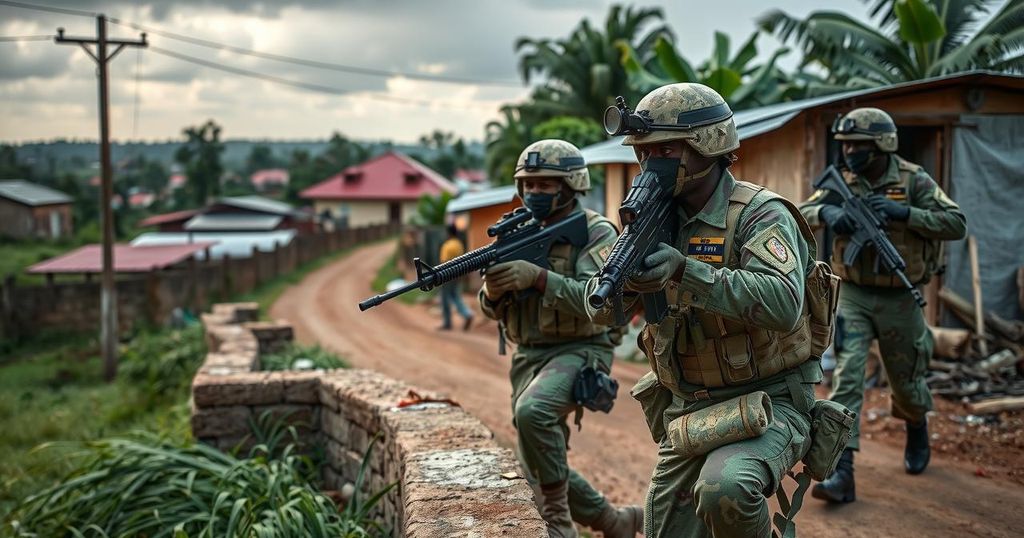Rwanda-backed M23 rebels have captured Masisi in eastern DR Congo, marking their second significant territorial acquisition within days. The ongoing conflict has generated a humanitarian crisis, prompting concerns from local leaders. Diplomatic efforts between Rwanda and DR Congo have stalled, while accusations persist regarding Rwanda’s exploitation of eastern Congo’s mineral wealth. The situation remains tense with potential implications for regional stability.
Rebel forces affiliated with Rwanda have taken control of the town of Masisi in the eastern Democratic Republic of Congo (DRC). This marks the M23 group’s second territorial conquest within days, following the capture of the nearby town of Katale. The M23 has expanded its dominance in the mineral-rich North Kivu province since 2021, prompting significant displacement among the local population, with hundreds of thousands fleeing their homes.
Amid this turmoil, Angola has endeavored to facilitate diplomatic discussions between DRC President Félix Tshisekedi and Rwandan President Paul Kagame; however, these negotiations collapsed last month. Alexis Bahunga, a member of the North Kivu provincial assembly, expressed grave concern about the situation, stating, “It is with dismay that we learn of the capture of Masisi centre by the M23,” which he warns is plunging the region into a humanitarian crisis.
Residents relayed that the M23 convened a meeting to assure the local population that their aim was to “liberate the country.” The DRC authorities have yet to issue an official response to the seizure of Masisi, the capital of its namesake territory, which houses approximately 40,000 residents. This locale is situated roughly 80 kilometers north of Goma, the provincial capital, a city that the M23 momentarily overtook in 2012.
Fears regarding the M23’s advance toward Goma resurfaced last year, though initial fighting diminished until December. Rwanda has been implicated in the conflict, as a UN report from July acknowledged the presence of around 4,000 Rwandan troops supporting the M23 in the DRC. Rwanda contends that the Congolese government has failed to adequately address longstanding conflicts within eastern DRC. The M23 emerged in 2012 as a faction aiming to defend the Tutsi ethnic group facing persecution, yet allegations persist that Rwanda exploits the conflict for the illicit extraction of valuable minerals from the region, including gold and tantalum.
Notably, the DRC government has initiated legal action against American tech giant Apple concerning the utilization of these so-called “blood minerals”, which raises ethical questions surrounding the tech industry’s sourcing practices.
The current upheaval in the DRC’s eastern region involves a resurgence of armed conflict, primarily driven by the M23 rebel group, which claims to defend the Tutsi population against discrimination and violence. Historically, the DRC has been plagued by complex interethnic tensions, foreign interventions, and the fierce competition for the region’s abundant mineral resources. The involvement of external actors, particularly Rwanda, has further complicated the situation, contributing to a cycle of violence and displacement. The M23, formed as an offshoot of earlier insurgent groups, has capitalized on these conditions to expand its territorial influence since its inception.
In summary, the recent seizure of Masisi by Rwanda-backed M23 rebels underscores the persistent instability in the eastern Democratic Republic of Congo. The ongoing conflict has exacerbated humanitarian crises and prompted international scrutiny of the involvement of foreign powers. With thousands displaced and vital resources at stake, the situation remains precarious, necessitating urgent attention from both regional governments and the international community.
Original Source: www.bbc.com






